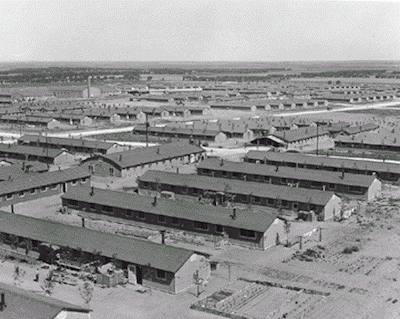
Legislation has been sent to President Biden to establish the Amache National Historic Site/Colorado State Archives
A World War II Japanese-American incarceration site in Colorado will be added to the National Park System as soon as President Biden signs legislation passed by Congress. To be known as Amache National Historic Site, the camp once covered 10,000 acres on the high, desolate plains of southeastern Colorado close to the town of Granada
“This continued growth of our National Park System is crucial for it to preserve locations and stories in American history, including those that are not easy to hear but essential to tell,” said Theresa Pierno, president and CEO at the National Parks Conservation Association. “The unconstitutional imprisonment of Japanese Americans is an undeniably tragic story. But by preserving Amache, we can ensure that as a country we confront our mistakes, honor the stories of those who were unjustly imprisoned, and protect the site for future generations.”
The legislation to establish the site was sponsored in the U.S. House of Representatives by Joe Neguse and Ken Buck and in the Senate by Michael Bennet and John Hickenlooper.
“I have waited many, many years to see the day where we can be certain that Amache, as a place of reflection, remembrance, honor, and healing, is protected for our current and future generations,“ said Bob Fuchigami, an Amache survivor.
“My father, David Takada, along with my grandparents, Kakuji and Fumi Takada, and my uncle, Andrew Takada, were all incarcerated in Amache,” said Michael Takada, Amache descendant and chief executive officer of the Japanese American Service Committee. "They lived for decades with a sense of shame and deep emotional pain and trauma."
According to NPCA, "Amache has the distinction of having the highest rate of military volunteerism per capita than any of the other incarceration sites and its prolific silkscreen shop created more than 10,000 war posters, a likely reflection of ongoing efforts of Japanese prisoners to actively prove their patriotism. Thirty-one Amache men were killed in the war, including one Medal of Honor recipient. Survivors and descendants of Amache have worked for decades to honor and preserve the land at risk of being forgotten, with assistance from the Amache Preservation Society, civil rights groups, veterans’ groups, academics, public lands advocates, the Town of Granada and other local and state elected officials."
Other Japanese-American incarcerations sites in the National Park System include Manzanar, Tule Lake, Minidoka, and Honouliuli.

 Support Essential Coverage of Essential Places
Support Essential Coverage of Essential Places







Comments
The addition of an another park dedicated to the incarceration of Japanese Americans does nothing but stretch the capacities of a beleagured National Park Service and limit the options for interpretation and visitation at all of the existing parks, including Manzanar, Minidoka, Tule Lake and Honoululi. We currently have a park where visitation is almost impossible and interpretation doesn't exist (Honoululi) because nothing but the geographical location of the site of the camp remained. Amache will be the same.
Recent additions to the NPS system have replaced operating parks administered by states and local groups. Camp Nelson, Ste Genevieve, Medgar and Myrlie Evers Home and Waco Mammoth all had operating visitation and interpretation prior to being assumed by the NPS. Programs were curtailed and visitation has been reduced as operating hours are limited and interpretation is no longer available.
More money isn't the answer. We currently have a national debt of over 30 trillion dollars. Expansion of the NPS isn't gonna happen and the money machine has run out...Congress is the culprit here.
"Congress meets tomorrow morning. Let us all pray: Oh Lord, give us strength to bear that which is about to be inflicted upon us. Be merciful with them, oh Lord, for they know not what they're doing. Amen." Will Rogers
Harryb3570 asks "How many of these parks do we need?" My answer is probably a lot more. America's National Parks interpret the culture, history, and natural wonders of our varied and expansive country. How many is too many? Maybe we should just get rid a few. How about the JFK National Historic Site in Brookline, MA? That would make a great apartment building. Maybe the Civil War battlefield along the Antietam Creek in western Maryland? Housing developments over the sprawling fields and hills - where the bloodiest day in American history took place - would be a much better use. How about Denali National Park? There is only one road on its more than six million acres of land - I'm sure private, commercial development could do better than that! And Amache. We just locked up thousands of American citizens for the crime of having Japanese ancestry. But that was then. Maybe a cattle ranch?
""The unconstitutional imprisonment of Japanese Americans is an undeniably tragic story."
It was determined to be constitutional. We cannot and should not re-write history based on presentism.